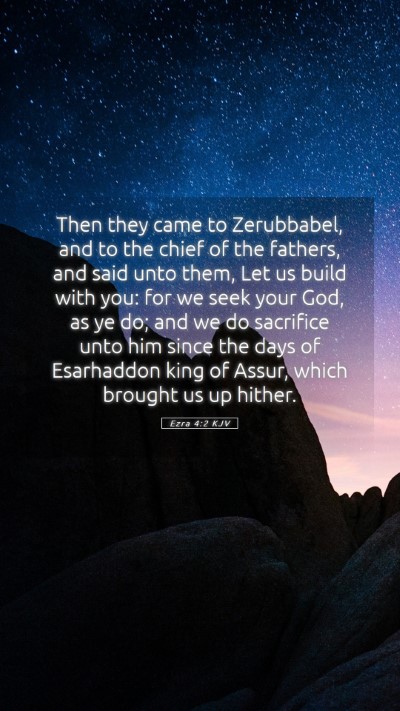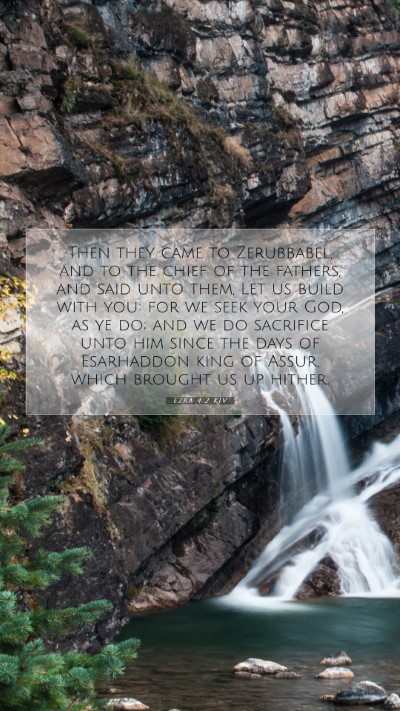Old Testament
Genesis Exodus Leviticus Numbers Deuteronomy Joshua Judges Ruth 1 Samuel 2 Samuel 1 Kings 2 Kings 1 Chronicles 2 Chronicles Ezra Nehemiah Esther Job Psalms Proverbs Ecclesiastes Song of Solomon Isaiah Jeremiah Lamentations Ezekiel Daniel Hosea Joel Amos Obadiah Jonah Micah Nahum Habakkuk Zephaniah Haggai Zechariah MalachiEzra 4:2 Meaning
What is the meaning of Ezra 4:2?
Then they came to Zerubbabel, and to the chief of the fathers, and said unto them, Let us build with you: for we seek your God, as ye do; and we do sacrifice unto him since the days of Esarhaddon king of Assur, which brought us up hither.
Ezra 4:2 Bible Verse Meaning
Understanding Ezra 4:2
Bible Verse (Ezra 4:2): "They came to Zerubbabel, and to the chief of the fathers, and said unto them, Let us build with you; for we seek your God, as ye do: and we do sacrifice unto him since the days of Esarhaddon king of Assur, which brought us up hither."
Overview of Bible Verse Meanings
This verse introduces the context of opposition that the returning exiles in Jerusalem faced during the rebuilding of the temple. It reflects the complexities of relations between the Jews and other nations, setting the stage for significant spiritual lessons regarding cooperation and the challenges of mixed motives.
Commentary Insights
-
Matthew Henry's Commentary:
Henry emphasizes the duplicity of those seeking to join in the rebuilding efforts. While they claim to worship the same God, their motivation may not be wholly aligned with the true worship of Yahweh. This invites reflection on the nature of partnerships in spiritual endeavors and cautions the faithful about potential influences that can dilute their commitment to God's work.
-
Albert Barnes' Notes:
Barnes provides insight into the historical context, noting that those who approached Zerubbabel were likely descendants of foreigners settled in the region who had adopted some aspects of the Jewish faith. He focuses on the importance of their offer to build as a thinly veiled attempt at assimilating into the Jewish community, highlighting the need for discernment in responding to outside influences.
-
Adam Clarke's Commentary:
Clarke elaborates on the significance of this interaction by emphasizing how these offers can be both tempting and dangerous for a community striving to remain faithful to their covenant with God. His reflections prompt believers to consider the implications of working alongside those whose dedication to God may not reflect genuine faith.
Key Themes in Ezra 4:2
- The Complexity of Collaboration: This verse underscores the challenges faced by the community as they seek to engage others in their mission. It raises questions about the motivations behind collaboration and the necessity of spiritual integrity in partnerships.
- Spiritual Discernment: The approach of the foreigners serves as a reminder of the need for discernment in accepting help. Not every offer for assistance is aligned with God's purposes, and believers must evaluate motives critically.
- Community and Identity: The Jews' identity as the chosen people of God comes into play as they navigate their relationship with outsiders who wish to join in their religious endeavors. This dynamic speaks to the heart of what it means to be a community of faith.
Applications for Today
In applying the lessons from Ezra 4:2, believers are encouraged to reflect on their own partnerships and collaborations. How do we discern the motives of those who wish to join us in our faith journey? What principles guide our decisions when working alongside diverse groups of people? This verse invites contemplation and serves as a guide for maintaining fidelity to one's beliefs amidst external influences.
Cross References
- Nehemiah 2:20 - Nehemiah's response to the enemies of the Jews further illustrates the importance of discernment in the face of opposition.
- 2 Corinthians 6:14 - This verse addresses the nature of relationships between believers and non-believers, emphasizing the need for spiritual alignment.
- Ezra 3:3 - The earlier rebuilding actions signify the dedication of the exiles to their worship and commitment to God's instructions.
Conclusion
Understanding Ezra 4:2 is essential for grasping the dynamics of faith-based collaborations and the call for vigilance in maintaining spiritual integrity as communities of believers navigate affiliations with those outside their faith. This exploration emphasizes the importance of deep scriptural engagement for contemporary believers seeking to apply ancient truths to modern life.


